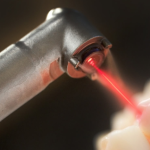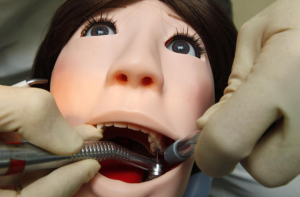Recently, I’ve been reading some really interesting things about what oral health care is going to look like in the future. It’s exciting reading and I’m looking forward to encountering those industry shifts and technological advances.
Like any other field, determining what’s going to happen in the coming years with perfect accuracy is impossible. However, some good, educated guesses can certainly be made based on the direction things are headed.
Here are a few of those possible examples that I found particularly interesting:
– The Rise of Genetics. Genetics is one of the most exciting frontiers of all medical (and a huge number of scientific) pursuits. As geneticists get closer to decoding our genome, they get closer to using our genetic information to diagnose and understand illnesses; individually determine the effectiveness of drugs and other treatments; monitor those treatments; find gene errors; predict possibly dangerous mutations; and more. Oral health care professionals may soon be able sequence a patient’s genetic information, detect elevated levels of the microbes that cause tooth decay, pick up on hereditary dental weaknesses or faults, identify troublesome gene mutations, spot the precursors to oral cancer, and numerous other health risks before they become problems. Then, the same genetic information can be used to design cures and fixes on a genetic level.
– The Rise of Digital, Too. Digital technology, by basically all accounts, is going to play an enormous role in the future of dentistry. Digital imagery will revolutionize the way the structure of teeth and mouths is determined, plotted, explored, reproduced, and extrapolated precisely based on the information present. Perhaps more fascinating, in the foreseeable future dentists will feed those digital images into a 3D printer, which will be able to print a new tooth, bridge, crown, etc., of the perfect dimensions, from incredibly high-quality and durable materials! (Maybe the best part – you don’t have to wait for the lab to manufacture it.)
– In Fact, Why Bother With a Fake Tooth? Oral health care researchers from a number of different disciplines have recently been putting their heads together about replacing your teeth with… your teeth. How? By growing a new tooth and doing so with your genetic material. These future dentists would do a genetic profile from your saliva and make an incredibly precise image of the phantom tooth with digital imaging. Then, manipulating biomaterial specific to the patient in question with nanotechnology at a molecular level (and the possibly inclusion of stem cells), enamel, dentin, and cementum can all be hypothetically be grown – a whole new tooth! And a tooth made from at least some portion of your genetic material.
– A Targeted Attack on Tooth Decay. Just like they’re getting better at everything else, dentists have gotten better at determining precisely what causes tooth decay. For instance, one of its chief causes is the streptococcus mutans bacteria. Our future dentists could identify precisely how much strep mutans is present, as well as other microbes, and can prescribe a perfectly-compounded pharmaceutical solution to target that precise, specific microbial makeup. The absolute best prescription for the absolute best outcome.
Those are just a few of the technologies and resources that are shaping the future of dentistry. What the others will be can only be guessed at. And I’m really looking forward to it!
~Jason










